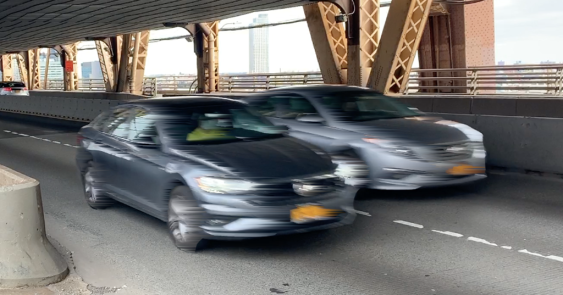The shortcomings of the current gas tax are well-known. The federal rate (18.4 cents/gallon) has not been raised in nearly twenty years and is not tied to inflation, yet it remains the primary source of funds for federal transportation spending. The problem is exacerbated by improving vehicle fuel economy. And as electric cars roll off the assembly line in greater numbers and become the vehicle of choice for more drivers, relying on the gas tax as the primary source of transportation funding makes even less sense.
This perfect storm suggests the time may be right to adopt vehicle miles traveled (VMT) fees -- charges based on how much people drive -- to pay for the nation’s surface transportation system. Congress is unlikely to pass a multi-year transportation bill anytime soon, and current stop-gap funding is due to expire at the end of June. But the results of a two-year University of Iowa VMT national field study offer a path forward for sustainable funding of surface transportation.
Preliminary findings from the federally-funded field study (the full report has not yet been released by the Department of Transportation) show that the system could work on a nationwide scale. The results, contained in a Transportation Research Board Journal paper authored by University of Iowa professors Paul Hanley and Jon Kuhl, also show that the public would accept the concept of paying a fee for road use based on distance traveled instead of gas consumed.
The field study was based out of 12 sites, monitoring more than 2,600 volunteer participants who drove a total distance of 21 million miles throughout the United States (except Alaska and Hawaii), for an average of roughly 9,000 miles per driver.
The study deployed a prototype mileage-based charging system with an on-board unit installed in each participant’s vehicle. The unit computed mileage-based user charges for federal, state and local jurisdictions and periodically uploaded accrued charges via a cellular link to a central billing center. The center subsequently created monthly billing statements that were sent to participants.
Privacy concerns, often cited as an argument against VMT-based charges, were taken into account in the study's design. While the onboard unit in each vehicle used a GPS receiver to determine driver location for the purpose of assessing state and local charges, the system did not retain or transmit any specific information regarding vehicle location or routes travelled.
The results of the field test showed that a nationwide system of mileage-based fees is completely feasible using existing technology. Early misgivings on the part of drivers faded as they gained more experience with the system: At the outset of the study, only 42 percent of participants held a positive view of GPS-based mileage fees; approval increased to 70 percent by the study's end.
The results also indicated a marked preference for accuracy over privacy on the part of participants. Over the course of the study, the monthly invoices issued to drivers were presented in varying degrees of detail. A whopping 60 percent of participants favored highly audited statements, which include a daily review of miles traveled. Only nine percent preferred the maximum privacy version, which lists only the total miles traveled per month. (In a second phase of the study, a modified version that fell somewhere between the two was favored by most of the participants.)
Three years ago, two separate federal commissions on surface transportation released reports recommending that the federal gas tax be gradually replaced with VMT charges. But the White House flatly refused to seriously consider the proposals at the time. With the House and Senate now at loggerheads over how to fund the nation’s transportation system – the House has taken a tenth short-term extension to a conference committee with the two-year bill the Senate passed in March – it is highly unlikely that a multi-year transportation bill will pass this election year.
We know that a national vehicle mile user fee system can work. The administration ought to take the initiative and support what most experts say is a fairer, more sustainable method to fund our roads, bridges and transit. But that likely won’t happen until long after the November election.





